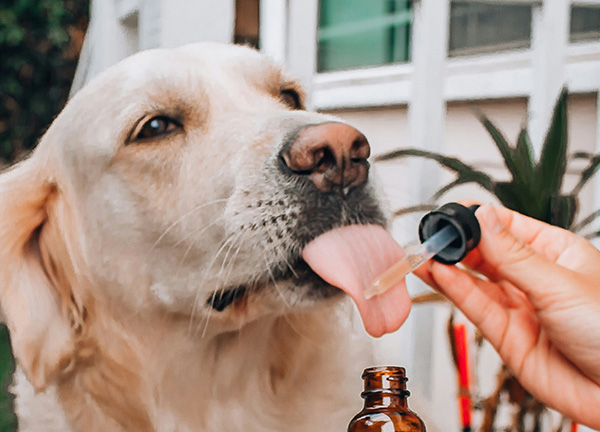Coconut oil, derived from the flesh of coconuts from the coconut palm tree, is either obtained through pressing or extraction processes. It comes in two primary forms: virgin coconut oil, which is unrefined and cold-pressed to preserve its natural flavor and nutrients, and refined coconut oil, which undergoes processing and lacks the rich coconut flavor.
While humans have long embraced coconut oil for its numerous benefits, pet owners are now increasingly curious if coconut oil for dogs provides similar advantages. Dog coconut oil is known for containing medium chain triglycerides (MCTs), a good fat that can support a dog’s digestive tract and overall skin health. Pet owners may add coconut oil to aid overweight dogs in managing weight loss or to support small dogs and larger dogs alike. However, applying coconut oil in small quantities is important to avoid excessive saturated fat intake.
Can Dogs Eat Coconut Oil?
Yes, dogs can eat coconut oil, but it should be given in moderation and with caution. Although it's typically safe, some dogs may be sensitive to the high-fat content. It's best to start with small amounts and observe your dog's response. For dogs with specific health issues, such as pancreatitis or obesity, coconut oil may not be the ideal option.
Coconut oil is packed with medium-chain triglycerides (MCTs), a form of fat that is easier to digest and metabolize than other types of fat. The main MCT in coconut oil is lauric acid, known for its antimicrobial, antiviral, and antifungal benefits. These fats provide a quick source of energy for dogs, without being stored as body fat as readily as long-chain fats.
Potential Health Benefits of Coconut Oil for Dogs

Coconut oil is often praised for its several health benefits, including improving the dog's skin and coat, aiding in gut inflammation, and supporting brain health. Some pet owners find that applying coconut oil helps with cracked paws, dry paw pads, and seasonal allergies. In addition, many pet owners have noticed improvements in their dogs' overall health and nutrition after introducing organic coconut oil into their dogs’ routines.
While not all of these health benefits are scientifically proven, many have observed these positive changes. Always consult veterinary medicine experts before changing your puppy's diet to ensure that coconut oil is safe for your dog's specific needs.
Improving Skin and Coat Health
When applied topically or consumed, coconut oil—especially virgin coconut oil or unrefined coconut oil—acts as a natural moisturizer. It helps to alleviate dry skin and itchy skin and can also improve the appearance and softness of your dog’s coat, giving it a healthier shine. Many dog owners have seen these health benefits by adding coconut oil to their dog's routine, particularly because of the medium-chain fatty acids (MCTs), like lauric acid, found in cold-pressed oil. Coconut oil for dogs is known for its antibacterial and antifungal properties, which can also be useful for skin infections or seasonal allergies.
Reducing Inflammation
Thanks to its anti-inflammatory properties, giving coconut oil—or applying coconut oil topically—may help reduce inflammation, swelling, and discomfort, particularly in dogs with arthritis or joint diseases. The MCTs found in coconut oil, such as lauric acid, help manage inflammation both in the skin and internally. Coconut oil could relieve your pup's irritated skin due to allergic reactions or infections.
Promoting Digestive Health
Coconut oil may help improve digestive health by boosting nutrient absorption and potentially reducing gut inflammation. It is often easier to digest than other fats, making it beneficial for dogs with sensitive stomachs.
Supporting Cognitive Function
The fatty acids in coconut oil, especially MCTs, are thought to fuel brain function. Some studies suggest that these fats may help slow cognitive decline in aging dogs, helping to maintain mental sharpness as they grow older.
Antimicrobial Properties
Coconut oil contains natural compounds that are effective against harmful bacteria, viruses, and fungi. This makes it a potential remedy for minor infections, whether consumed or used topically on the skin. It can also help prevent infections from cuts or wounds.
Boosting Energy Levels
Medium-chain triglycerides (MCTs) from coconut oil are metabolized quickly, offering a rapid energy boost for active dogs or those recovering from illness. Additionally, coconut oil supports dogs' skin health with its antiviral properties and may help overweight dogs lose weight, enhancing both energy and skin wellness.
Coconut Oil for Dogs with Epilepsy
Some small studies suggest that MCT oil, found in coconut oil, may help reduce the frequency and intensity of seizures in dogs with epilepsy. Though additional research is necessary, this may hold promise as a natural supplement for dogs with this condition.
Using Coconut Oil for Wound Healing
The antimicrobial properties of coconut oil can support the healing of minor cuts, scrapes, and infections. When applied to wounds, it may help inhibit bacterial growth and facilitate quicker healing.
Coconut Oil and Weight Management
Though coconut oil has many benefits, it is also calorie-dense. Overuse may result in weight gain, particularly in less active dogs. Pet owners should carefully monitor the quantity they give their pets to avoid unwanted weight gain.
Coconut Oil for Bad Breath in Dogs
Coconut oil’s antibacterial properties may help combat bad breath in dogs. Adding a small amount to your dog’s food or brushing their teeth with a coconut oil paste can help reduce odor-causing bacteria in the mouth.
Risks and Side Effects of Coconut Oil

Despite the several health benefits of coconut oil for dogs, there are risks to consider. Too much coconut oil, whether it's virgin coconut oil or unrefined coconut oil, can lead to stomach upset, including diarrhea or greasy stools, especially if introduced too quickly into a dog's diet. For dogs with fat-sensitive conditions, such as pancreatitis, giving coconut oil is not advisable due to its high content of saturated fats, which could worsen their condition.
In rare instances, some dogs may have allergic reactions to coconut oil, exhibiting symptoms such as itchy skin, redness, or digestive issues. If you observe any signs of an allergic reaction, like excessive scratching or discomfort, discontinue the use of the coconut oil and contact your veterinarian right away.
How to Introduce Coconut Oil to Your Dog's Diet
When starting with coconut oil, begin with small quantities, like ¼ teaspoon per day, and gradually increase the amount as your dog adjusts to it. This slow introduction helps avoid stomach upset.
Dosage Recommendations
For most dogs, the recommended dosage is one teaspoon per 10 pounds of body weight. However, monitoring your dog and adjusting the amount accordingly is essential, especially if your dog has a sedentary lifestyle.
Topical Applications of Coconut Oil
For topical use, coconut oil can be applied to a dog’s skin, wounds, or paws. It offers antiviral properties and soothing benefits. However, overweight dogs should be monitored to avoid excessive licking, as it may interfere with their efforts to lose weight or lead to overconsumption.
Consulting with Your Veterinarian
Before incorporating coconut oil into your dog's regimen, it's best to consult with your veterinarian. Whether you’re using cold-pressed oil, called virgin coconut oil, or refined coconut oil, your vet can confirm if coconut oil is good for dogs with your specific pet's needs. This is particularly important if your dog has underlying health issues like digestive disorders or is prone to weight gain. A veterinarian will also help establish the appropriate dosage to ensure the coconut oil safe usage, balancing its health benefits with any potential risks.
Alternatives to Coconut Oil
If coconut oil doesn’t suit your dog’s needs, alternative oils like salmon oil or flaxseed oil are rich in omega-3 fatty acids that support skin and joint health. These alternatives also offer pet health benefits without the high saturated fats found in coconut oil. Always ensure any dietary supplement you introduce suits your pet’s unique health conditions with proper veterinary approval.
